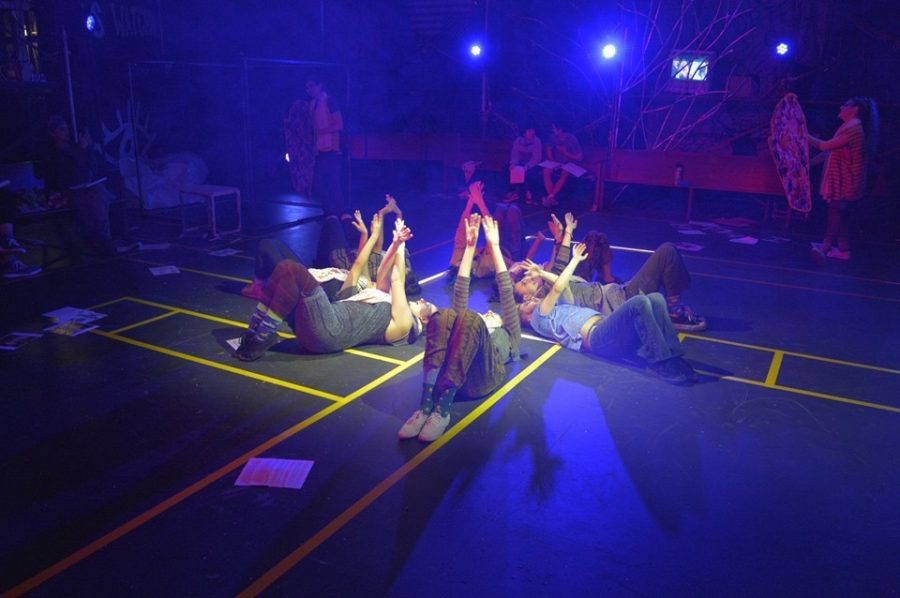“Pussy Riot Belongs Everywhere!” Unconventional Play Receives Warm Audience Reception
The Mermaid Players annual autumn show drew in a packed crowd on opening night, Friday, Nov. 1, with their adaptation of “We are Pussy Riot (or) Everything is P.R.”
Mathers Theatre was transformed into a collage of urban, punk and religious imagery, creating a multi-media spectacle for the play, written by Barbra Hammond and directed by Assistant Professor of Theater & Dance Karie Miller.
The actors engaged audience members differently than in previous shows performed by the Mermaid Players. Audience members were broken into three groups and then taken into the theater separately. This allowed each smaller group to enter through the backstage area that was set up with red curtains, dim lighting, and actors/actresses portraying police officers. Protestors proceeded to surround and rush through the audience, while one handed out Article 31 of the Russian constitution. The pre-show area transitioned from a conventional viewing space to an interactive space.
The stage itself was set up in the round, meaning that the audience surrounds the performance space on all sides. Audience members were instructed to sit either on the floor, in the church pews, or atop scaffolding. Besides the unique seating arrangements, audience members were also given balaclavas (which were worn by the real Pussy Riot members and many of the cast) and head scarves, while men were asked to remove their hats in fitting with Russian Orthodox Church values. Mid-show, someone was encouraged to read aloud a witness statement. In this way, the audience donned costumes and took on roles within the performance, helping to “[bridge] the gap between show and audience” said cast member Alex Tapia ’22. “The performance is very personal. We don’t want it to be like actors performing to an audience, it’s like the audience is part of the show itself.”
Miller’s directing choices reflect the punk and feminist attitudes seen in Pussy Riot. Cast member Lissy Gold ’20 explained that, “punk is about not confirming to the mold,” and is instead, “about doing your own thing because that’s what works.” Not only did the cast spend the first week of rehearsal developing their characters and bonding as a group, the theater department, “explicitly established a feminist rehearsal space, which is new for us.” In terms of creating a feminist workspace, students and professors worked to maintain a horizontal power structure making all members equal collaborators. Another important aspect that Miller introduced from the Chicago theatre scene was their “Oops/Ouch Policy” which aimed to reduce extraneous apologizing while recognizing crucial conflicts.
Deck crew member Elizabeth Warren ’22 said, “I feel like in order to be a successful person in the theatre community you need to have an understanding of all aspects of theater, whether that be acting and directing or the technical side: sound, deck crew.” Pussy Riot was a tech heavy show and necessitated more technicians than actors. With regards to handling the added technical challenges, Warren explained that, “any theatre production, no matter the size, always requires a great team and that’s what we have here at Dickinson College, an incredible team.”
Pussy Riot is a Russian collective of young, mostly female activists who utilized the ideology of punk to protest the illegality of the 2012 Russian presidential election. Following a 48-second performance of their punk prayer, “Virgin Mary, Chase Putin Away!” in Christ the Savior Cathedral in Moscow, two members received two-year-long prison sentences. When the story reached the Western media, the experiences of those women and others took on international prominence as an example of performance art and activism. This play is informed by the trial transcripts, interviews, letters, media coverage, and statements and is performed by a group of Yurodivy (“holy fools”), a type of character in Russian literature. All of the actors portrayed Yurodivy and the Yurodivy then play the more distinct characters seen in the play.
The show continued with performances on Saturday, Nov. 2, Sunday Nov. 3, and Monday Nov. 4.






